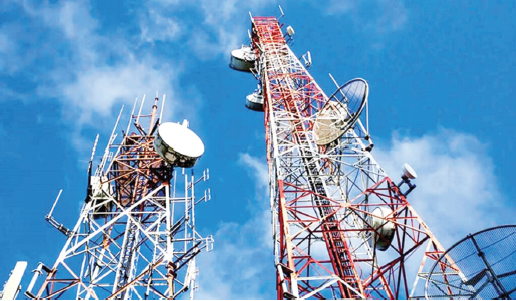
Many countries of the world consider telecoms infrastructure as national assets. From China to India, down to the United States, countries impose strict sanctions on individuals who destroy such assets.
Nigeria had a total of 303.64 million connected telephone lines in February 2022, according to the Nigerian Communications Commission.
About 197.77 million of these lines were in active use, according to the commission. GSMA, the global association for telecommunication companies, said Nigeria had 97.5 million unique mobile subscribers as of September 2018.
Experts have said that the role of telecoms in the day-to-day lives of Nigerians has grown drastically since it was launched in 2001. According to them, every sector of the economy leveraged on some form of telecoms service today, making it an important infrastructure.
They said this was a pointer to the critical nature of telecoms, arguing that such was enough to motivate any responsible government to classify telecom infrastructure as critical national assets.
They added that classifying telecom infrastructure as CNI would reduce cases of dropped calls, bad Internet, and terrible network delivery.
In October 2021, MTN Nigeria Communications Plc had a national downtime. Subscribers could not make calls, send SMS, and access the Internet, leaving them stranded and helpless. Today’s world is driven by communication technology.
An MTN user on Facebook, Ayodeji Adeyoriju, said, “We are expecting something huge from Lagos today. Sadly, the carrier uses MTN and doesn’t have our other lines. We don’t know what to do right now.”
Another user, Uloma Godpikin said, “I have cleaned my SIM a hundred times thinking my SIM is damaged. Please do something about this issue.”
Anytime people cannot access communication services, they panic. They sow threads on Twitter and lament on Facebook.
According to the NCC, there were 32,939 towers belonging to mobile and collocation and infrastructure companies with a total number of 36,998 base stations in 2020. Microwave coverage was recorded at 290,126.59km.
It said a total of 194 gateways were in use in the industry as of December 2020 and total fibre optics deployment stood at 104,586.34 km (terrestrial fibre and submarine cable).
The Industry Working Group on Multiple Taxation, constituted by the NCC, defined critical infrastructure assets which were essential for the effective functioning of any society or economy.
It said these assets were identified as the basic facilities, services, and installations critical to the social and economic well-being of any State.
It said, “They represent utility assets or ‘public works’ which are indivisible from the efficient operational activities of any society. It is universally accepted that any nation’s health, wealth, and security depend upon the production and distribution of certain goods and services.
“The array of physical assets, functions, and systems across which these goods and services move are considered critical infrastructures. Such infrastructures are identified as the most critical to any society and are prioritised based on the level/impact of risk associated with their loss to attack or disaster.”
The group disclosed this in a document titled, ‘Brief on the Designation of Telecommunications Infrastructure as Critical National Infrastructure.’
According to them, communication infrastructure was a critical national asset and deserved the highest levels of protection since they were important to the efficient functioning of any society. They said there was a need to pay commensurate attention to the operating environment of communication infrastructure since they played a supportive role to other infrastructure, social, and economic activity in the nation.
They added, “Indeed communications can be described as an adhesive which holds other composite systems in our society together. Communications provide the conduits through which interactions between and within other sub-systems, which enable the effective functioning of society at large.
“Therefore, a breakdown in the communications system can lead to a breakdown in many other societal systems which depend upon communication and exchange of information to function successfully.”
According to an expert in the industry, telecom infrastructure was prone to theft, vandalisation, destruction, and seizure.
The expert said, “Fibre cuts are frequent in the industry. When telcos newly started operations, those who cut our fibre were vandals and thieves. Copper was a component of fibre in the old days.
“They used to steal our fibres to make forks and spoons, but after some time those vandals discovered that fibres were now useless to them because we stopped using copper-made fibre and started using glass-made ones.
“Now, there are constructions everywhere, and someone is always digging a drainage system somewhere. These are the people cutting fibres now. Network connections are usually affected after any fibre is cut. Sadly, most of them never notify us after a fibre cut, Julius Berger is probably the only construction company that notifies us if it cuts any fibre.
“Also, we still witness generator and battery theft too. For instance, when people steal diesels, they puncture holes into our tanks, collect what they can with their tanks and let the rest waste away. We still have that.”
The expert added that the drive to make telecoms infrastructure national assets started in 2004 after the bill to make electricity and others critical infrastructure, national assets, were passed.
The Chairman, Association of Licensed Telecom Operators of Nigeria, Gbenga Adebayo, said fibre cuts were operator-specific and had become part of the operational issues which players in the industry had to deal with.
He said, “The implication of fibre cut is that it affects network delivery, it affects the quality of services. It can lead to prolonged outages depending on the root of impact. It also disrupts smooth operations.
“That is why we are saying that if we classify telecoms as critical national infrastructure, everyone will have a duty of care. All public actors and private actors will have a duty of care for the infrastructure. Classify telecoms as critical national security and economic infrastructure. Rid this infrastructure of all types of interference so that we can have smooth and secure operations.”
According to Adebayo, access to telecom services had now become a basic human right.
During a 5G stakeholder meeting in 2021, an Airtel representative disclosed that the company had suffered about 400 fibre cuts that year. The official blamed road constructions for most of these cuts.
The President of the National Association of Telecoms Subscribers, Adeolu Ogunbanjo, said not making telecoms a critical national infrastructure was creating an extra burden on the shoulders of telcos.
According to him, the government only focused on extracting taxes from the sector. He added that the government place little priority on the sector, hence its continued negligence.
He stated, “The government is turning deaf years to it, and that is the operating environment of the network operators. It is important that government appreciates this. Currently, government is leveraging on what it has not protected, and charges taxes.
“The government should be sensitive to the telecoms industry. They can’t be taxing what they are not protecting. They should provide protection for what they what to tax. “If the government doesn’t heed these prayers, subscribers and network operators might need to force action.
“State governments were directed to explore other means of resolving tax-related disputes and must not resort to the sealing of telecommunications sites.”
However, telecoms sites and infrastructure are still subject to illegal shutdowns which spiral into terrible network delivery, affecting the day-to-day activities of Nigerians.
Recently, the Kogi State Government, through the Kogi State Internal Revenue Service, shut down telecom sites in the state.
This increased the risk of a communications blackout in the entire Kogi State, parts of the Federal Capital Territory and had possible impacts on service availability in parts of Nassarawa, Benue, Enugu, Anambra, Edo, Ondo, Ekiti, Kwara, and Niger States.
Decrying the state of telecoms infrastructure, ALTON recently asked the NCC to prevail on the Federal Government to sign an executive order declaring telecoms infrastructure as critical national assets to reduce the cost spent in replacing them.
How telecom infrastructure is treated affects how telcos can deliver communication services in the nation.
The Chief Operating Officer, Association of Telecommunications Companies of Nigeria, Ajibola Olude, stated that prioritising telecoms infrastructure would increase investment in the sector and boost the nation’s Gross Domestic Product.
He said, “This will boost investment in the sector as investors would be guaranteed of the security of their investment. This increases Foreign Direct Investment and capital importation in the process.
“It will also bring about an increase in the contribution of telecoms to the GDP. There are so many benefits that will come to the industry once telecoms infrastructure is made critical national infrastructure.”
According to him, if telecoms assets were classified as critical infrastructure, those illegally tampering with them would face legal problems.
Nigeria is rife with statistics of insufficiency, from education to health care, water supply, road network and more. Telecoms is probably the only sector that has risen above the nation’s limitations to deliver on its promise.
While there are still gaps, no other sector comes close in terms of reach and delivery. Because of this, Nigeria’s digital economy drive is predicated on the strength of its telecoms sector. Yet, the one sector that is working in the nation is also the one without government protection.
Recently, the ALTON chairman warned that no industry was immune to failure. The President of NATCOM echoed this warning, saying that no sector of the economy was safe if telecoms weren’t protected.
Telecoms infrastructure is the infrastructure of infrastructures, according to experts. It allows other infrastructures to function. If it crashes, others will also. To avoid this, there is a need for the Federal Government to act, experts say.
Copyright PUNCH.
All rights reserved. This material, and other digital content on this website, may not be reproduced, published, broadcast, rewritten or redistributed in whole or in part without prior express written permission from PUNCH.
Contact: [email protected]





